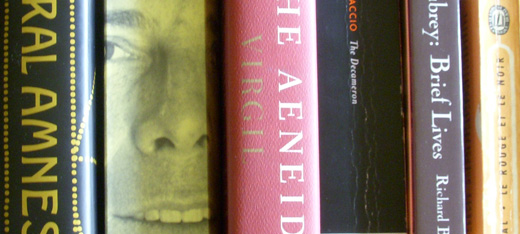Thursday Morning Read
As I glance over the last ten stories in the Decameron, I’m tempted to cover them in five days: the first four in one, then the next three, and a day for each of the last stories, which are on the long side. Within the end so near at hand, I want to run for it. And yet… I shall miss this daily companion. We shall see.  Â
¶ Dioneo ends the Ninth Day of the Decameron with a very rude tail that involves, er, pinning the tale on the donkey. “I don’t want a tail! I don’t want a tail!” cries the husband, thus breaking the spell that would have enabled his friendly priest to turn his wife into a horse. Ahimè.
¶ In Aubrey, the letter “O,” and three remarkable lives. The vissicitudes endured and overcome by John Ogilby (1600-1676) seem remarkable until one reflects on the number of fellow Scots who triumphed just as persistently, somewhat later on, on the other side of the Atlantic. Dr William Oughtred, whose Clavis Mathematiciae introduced the symbol “x” to represent multiplication, was a selfless teacher who best preferred students “that tugged and took pains to work out question” — and who wrote in a decent hand. As for John Overall, one of “God’s Secretaries” — the divines who redacted the Authorized Version (“King James Bible” to you) — had as his wife one of the beauties of the age. “The good old dean, notwithstanding he knew well enough that he was cuckholded, loved her infinitely: in so much that he was willing she should enjoy what she had a mind to.
The Dean of Paul’s did search for his wife,
         And where d’ye think he found her?
Even upon Sir John Selby’s bed,
         As flat as any flounder.
The last line is vastly enriched by its proximity, in my studies, to Boccaccio.
¶ Roaming through Merrill, I come across the following verse to memorize, the last poem in the collection Late Settings (1985).
Clasping her magic
Changemaking taffeta
(Old rose to young spinach
And back) I’d takenSuch steps in dream logic
That the Turnstile at Greenwich
Chimed with laughter —
My subway token.
¶ Clive James on Ernst Robert Curtius, the German medievalist (and modern critic) who thought that he could keep vital traditions alive by retiring to his library during the Nazi catastrophe. James does not blame him for this, but he finds “incomprehensible and unforgivable” Curtius’s silence on the ghastliness afterward.
At the height of his prestige, with the whole international scholarly world for a worshipping audience, he never alluded even once to the extermination camps. George Steiner was right to point out that Eliot’s post-war Notes Towards the Definition of Culture, by neglecting to mention what had just happened in Europe, disqualified itself from being a definition of culture. The same objection can be made to Curtius’s thunderous silence.
For James, it’s not just “the principle of the thing.” It’s nothing less than the obligation of every humanist to acknowledge, publicly and often, the state of health of the civilization in which he or she lives and works — at least whenever conditions do not make such acknowledgment personally catastrophic.
That is why no thoughtful person, at a minimum, can too often decry the inappropriateness of Richard Cheney’s career in public life. The man was wicked enough in his Halliburton aerie, and ought to have been locked up in his very own private sector.

